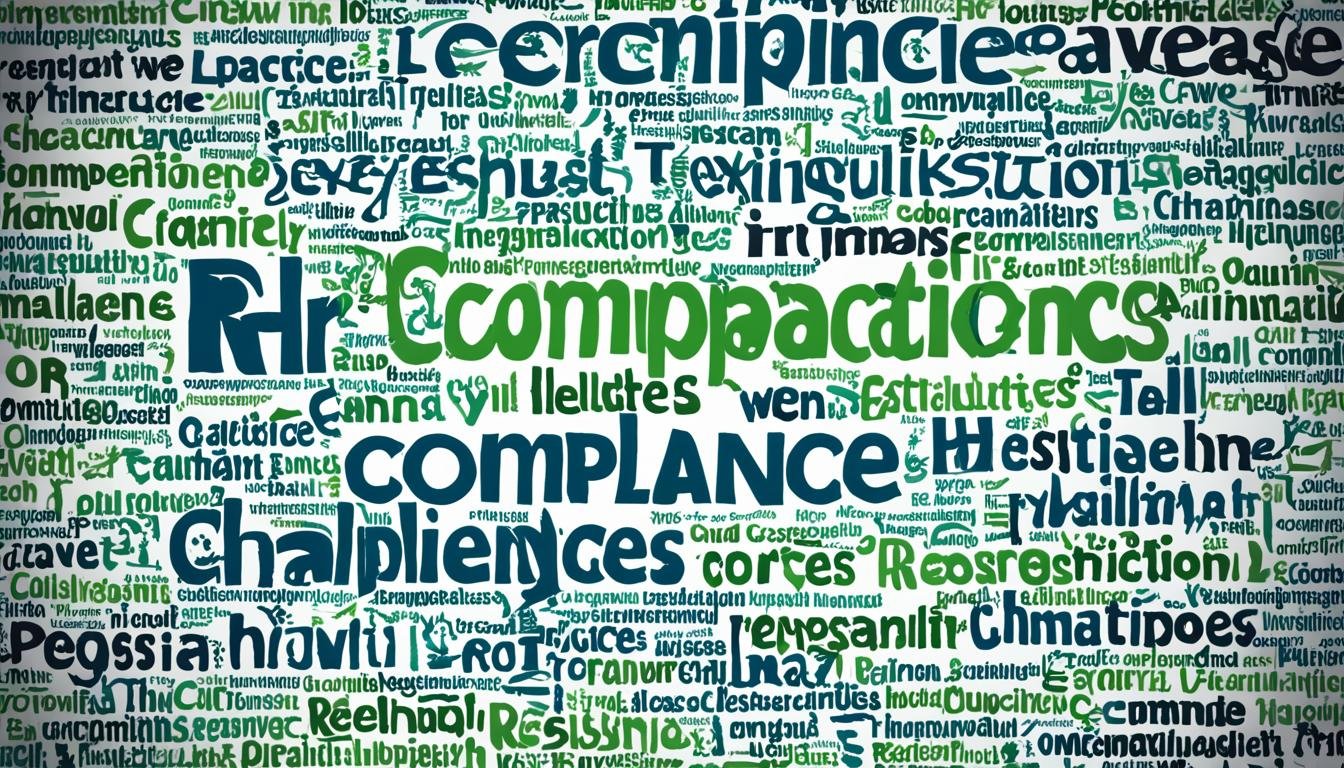What are the most common HR compliance issues in Ireland and how can they be avoided?
In Ireland, every business faces HR compliance challenges. These are important to avoid legal trouble. Workweeks cannot go over 48 hours, ensuring employees’ rights.
Companies must calculate tax and benefit costs properly. They also need to pay attention to the minimum wage. For example, from January 1, 2024, it will be €12.70 for workers 20 and over.
It’s vital to meet statutory pay rules to avoid issues. For instance, sick pay will increase to 10 days by 2026. Also, parental leave benefits like €274 a week for maternity and paternity leave matter.
Meeting Irish employment law means dealing with taxes properly. Income taxes can range from 20% to 40%. Employers must also handle social insurance and the Universal Social Charge correctly.
To keep things running smoothly, businesses should do a few things. They must provide detailed payslips before paydays. It’s also crucial to keep accurate payroll records and report in real time.
Staying current with HR laws is a must. This helps handle various situations. Good record-keeping, following contracts closely, and enforcing whistleblowing policies are key. These actions ensure the business runs correctly and legally.
Introduction to HR Compliance in Ireland
Ireland stands out as a hub for business innovation. Its lively culture and strong economy draw companies in. Yet, HR compliance here needs careful handling, especially about payroll and laws.
For those wanting to set up payroll, help is at hand. International payroll services like Cintra international payroll make things easier. Businesses can follow local rules without opening a physical location. While some choose to make a legal entity for smoother operation, it’s not always necessary.
The process of registering for taxes in Ireland is easy. Having a local bank account isn’t a must, but it does make things smoother. With Irish payroll solutions, handling payroll laws becomes simpler. This lets companies focus on their main goals while ensuring they meet all rules.
Companies aiming to thrive in Ireland must know its work regulations well. It’s crucial not to mistake workers for contractors to avoid big fines. Plus, if someone works for over a year, they have rights to know why they were let go, preventing unfair dismissal claims.
Dealing with redundancy pay is also very important. Only those who have worked more than two years get this benefit. It’s two weeks’ pay for each year served. Employers must incorporate these rules in their payroll solutions.
Getting payroll and HR compliance right in Ireland requires real care. With the help of pros like Cintra international payroll, and by keeping updated with laws, businesses can smoothly handle their payroll tasks. This way, they create a proper, effective work environment.
Understanding Employment Law in Ireland
Irish employment law is a detailed system of rules to make sure workers are treated fairly. It also sets out what employers must do. These laws cover everything about being employed in Ireland.
Key Employment Legislation
The Employment (Miscellaneous Provisions) Act 2018 is an important law. It stops zero-hour contracts in most cases. It also sets rules for minimum pay and hours. This makes work more stable and predictable for employees.
The GDPR 2018 is all about protecting personal information. It gives people more say over how their data is used. Now, companies must handle data carefully. This law affects how employee information is handled too.
The Terms of Employment (Information) Acts 1994-2014
The Terms of Employment Acts from 1994 to 2014 are key. They say employers must give clear contracts to workers. These contracts spell out things like job roles, pay, and hours. They help avoid misunderstandings by making everything clear from the start.
Other essential laws are the Payment of Wages Act 1991, which says employers must give detailed pay slips. The Industrial Relations (Amendment) Act 2015 helps workers improve their work terms without a group agreement. Finally, the Organisation of Working Time Act 1997 sets limits on hours worked and outlines annual leave. These rules make sure workplaces are fair and safe for everyone.
Data Protection and GDPR Compliance
In Ireland, following GDPR rules means businesses need to have strong data protection practices. It’s important to get clear consent from people about using their data. But, getting consent from workers might be hard because of work relationships.
There are different reasons listed in the GDPR for using people’s data. One is for work contracts. This means companies must be careful when using data about their workers. They must follow Irish laws on privacy.
The GDPR doesn’t allow using very private data unless there are very good reasons. These might include someone’s clear permission or if it’s needed for the job.
When jobs involve a lot of data processing, a Data Protection Impact Assessment (DPIA) is often needed. This is common in companies dealing with HR data. Businesses must also respect the rights of people whose data they use. They include the right to be forgotten, to take data to a new employer, to correct errors, to limit use, and to say no to certain uses.
In Ireland, the Data Protection Commission (DPC) is serious about making sure the GDPR is followed. In 2022, they looked into over 9,000 cases. Breaking the GDPR rules about worker data can be very expensive. Fines can be up to 20 million euros or 4% of a company’s global sales. Common mistakes come from sharing personal emails by accident or not handling privacy questions well.
Businesses might need a Data Protection Officer (DPO) if they’re always watching or working with a lot of private data. Beyond the GDPR, different EU countries might have their own special rules for worker data. Companies should know and follow these rules too.
To meet GDPR rules in Ireland, companies should think about what they need data for and do a DPIA when it’s risky. They should also tell their workers clearly about how they’ll use their data. It’s important for everyone at work to understand privacy laws and to use data safely.
Health and Safety Regulations
In Ireland, the Safety, Health and Welfare at Work Act 2005 is the law for workplace safety. It’s more recent than the 1989 Act, putting clear rules in place. This law makes sure Irish work settings are safe, requiring employers to train their teams and keep them safe.
The Safety, Health and Welfare at Work Act 2005 insists that bosses check for dangers and fix them. It also says workers get time off for safety lessons. This helps everyone know how to keep the workplace safe in Ireland.
There are special rules for pregnant employees, like the Health and Safety Leave in the Maternity Protection Act 1994. During this time off, they earn normal leave and wages for the first 21 days. Companies must stop bullying and deal with any threats of violence in their safety plans.
It is essential to follow these safety rules to protect people and a company’s name. Bosses need good plans for emergencies and to teach employees. If they don’t follow these rules, they face tough penalties, the Health and Safety Authority can even name them.
Anti-Discrimination Laws
The Employment Equality Acts 1998–2015 are key in Ireland’s fight against discrimination. They make sure everyone is treated fairly at work. They protect people from being treated differently because of things like their gender, age, or race. Employers have to follow these laws to make their workplaces safe and welcoming for everyone.
Employment Equality Acts 1998–2015
The Employment Equality Acts in Ireland set out rules for fairness in jobs. They warn against wrongly calling workers independent contractors. This mistake can lead to heavy fines, up to €250,000.
These laws also say no to unfair treatment because someone is disabled, old, from a different race, or LGBTQ+. They ensure fairness when it comes to letting employees go. If someone has worked at least two years, they should get payment if they lose their job. This payment includes two weeks’ pay for each year they worked, all at once.
Ensuring a Non-Discriminatory Workplace
Stopping harassment at work is important to keep the environment fair. Employers must shield their workers from harassment, including training, clear complaint channels, and serious punishment for those who violate the rules. This way, everyone at work is respected and treated equally.
Workers in Ireland can join unions without worry. They are protected from being fired or treated unfairly because they belong to a union. This shows how much Ireland values making the workplace open and fair. Companies must regularly check their hiring practices to avoid discrimination and stay in line with the laws.
Employers should see these anti-discrimination laws as crucial for a healthy workplace. They help create a place where every employee feels valued and respected.
Common HR Compliance Issues
In Ireland, HR compliance is a big challenge. It often leads to data privacy problems and wrong employee contracts. Companies must pay close attention to these issues to stay compliant and avoid getting fined.
Data Protection Breaches
Issues with data privacy are a big deal. They usually happen because of weak internal rules or not fully understanding GDPR rules. Companies must make their data security strong and give their staff good GDPR training. Doing these things helps prevent data privacy problems before they happen.
Incorrect Employee Contracts
Many times, employee contracts are wrong. This can happen because some details are missing. Or there are errors in the required information. It’s very important that companies issue correct, clear contracts. These contracts should be up-to-date and follow the laws in the Terms of Employment (Information) Act 1994. Getting these contracts right helps companies avoid trouble.
Companies in Ireland can tackle compliance issues well. They need to be proactive. This means they should have good strategies and give their staff solid training on data protection and contracts. This way, these important areas are well taken care of.
Disciplinary Procedures and Compliance
Knowing disciplinary procedures is key to following HR rules in Ireland. A good system for handling wrong actions by employees in Ireland is clear and just. It makes sure punishments are the same for everyone and keeps the company safe and fair.
“The essential elements of any disciplinary procedure include clarity on the basis for disciplinary action, well-defined penalties, and availability of an internal appeal mechanism.”
Employee reps, such as coworkers or unions, are very important. This is as stated in the Code of Practice and backed by laws like the Protection of Employment Act 1977 and European Regulations of 1980. Acts like the Safety, Health, and Welfare at Work Act 1989, among others, give specific steps for these cases.
Discipline might start with just a talk or end in firing, but it usually follows steps. Firing right away only happens in very bad cases. When there’s a possible big rule break, you might be sent home until the issue is clear. A good rule is to forget about smaller mistakes after a while.
It’s crucial to keep good records so everyone knows and follows the rules. In Ireland, most workers are paid at least €12.70 an hour and get paid leave. This helps keep the workplace fair yet disciplined. Handling misbehavior not only keeps the rules in line but also builds a caring work environment.
Working Time Regulations
The Organisation of Working Time Act 1997 is vital for working time rules in Ireland. It makes sure workers don’t work too much, helping them keep a good work-life balance. This law is important because it prevents employees from working more than the maximum hours allowed by the law.
This means, on average, employees should not work more than 48 hours each week. This is checked over four months. Different jobs might have different rules, but the main goal is to keep employees safe and healthy.
Under the working time regulations Ireland, rest times are also set. Employees get 11 hours off every day and 24 hours off every week. They should also get a 15-minute break after 4½ hours of work and a longer break after six hours. These breaks help workers relax during their shifts.
It is the responsibility of employers to track all hours their employees work. This helps follow the law and keep work hours fair. They also must pay for overtime and give employees holiday time as the law requires.
Annual leave is a key benefit for all employees in Ireland. Workers get at least four weeks of time off each year. This is important for their well-being and keeps them happy and motivated.
People who work at night also have special rules under this act. If they work between midnight and 7:00 a.m. for more than three hours, they are night workers. They should not work more than 48 hours a week, on average over two months. This protects those with non-traditional hours.
By sticking to these rules, companies not only follow the law. They also help create a better working environment for everyone. These laws show Ireland’s commitment to fair and safe workplaces.
Best Practices for Record Keeping
Keeping detailed HR records is key to following Irish laws. Setting up strict record-keeping rules helps avoid problems. It’s important to record everything accurately.
Payroll Records
It’s vital to keep proper payroll records in Ireland. Employers must keep detailed earnings and deductions for six years. These records must be easy to check by the Workplace Relations Commission. This includes all salary details, taxes, and extra pay.
Time and Attendance Records
Managing attendance well is also crucial for HR compliance. All work hours, leave, and absences should be noted. This meets requirements set by the Organisation of Working Time Act 1997. It ensures employees get enough breaks and don’t work too much.
Having strong record-keeping systems makes responding to audits easy. Modern HR tools help a lot in managing records. They make data accurate and accessible.
Ensuring Compliance with Employee Contracts
Irish employers must follow strict rules about employment contracts. They need to be clear about job duties, pay, and working conditions. By keeping these details up to date, they can prevent legal troubles and have a smooth workplace.
Not sticking to these agreements can lead to big fines. For instance, labeling workers as contractors incorrectly can cost up to €250,000. You could also face jail time for up to 10 years. This is set by the Revenue Commissioners. So, getting the right details in contracts is key.
Keeping to these agreements means keeping good records and updating contracts when needed. This includes following laws from the Terms of Employment (Information) Act 1994. It’s crucial to give clear, written contracts on time to meet legal obligations Ireland requires.
Employers also need to think about redundancy payments. This is often a reason for disagreement. Workers who have been with a company for more than two years should get two weeks’ pay for each year.
Doing regular checks on these contracts is important. It helps find and fix any mistakes, ensuring everything runs smoothly. Employers need to keep an eye on how contracts are being used, stay updated on the law, and make sure all rules are followed correctly.
Whistleblowing Policies and Procedures
In Ireland, the Protected Disclosures Act protects workers who report bad practices at their jobs. Its goal is to make sure employees can safely report issues. This law says you can talk about many types of problems, like crimes at work, breaking the law, and threats to health.
In 2022, the Act was changed to offer more protection because of an EU rule. These improvements will start on January 1, 2023. Companies must make it easy for workers to report problems and keep their names secret. But sometimes, names may not stay secret if it’s needed to find out the truth or stop crimes.
All companies must now create detailed plans to keep their workers safe when they report problems. They need to have special ways for employees to share concerns that are managed by people who know the law well. Employers also need to keep learning about new laws. Government agencies must update how they handle reports by the start of 2023.
The way companies deal with reports should be open and safe. Employees can tell someone inside their company about the problem, or they can talk to an important person. Sometimes, they can even go outside to an official office. It’s not just regular workers who are protected. It’s also people like those in training, workers hired by agencies, volunteers, and people looking for jobs. This way, everyone has a chance to be safe.
Checking how well your company follows the rules by looking at past reports is a good idea. Now, about 70% of businesses in Ireland know how to handle work complaints and problems. This number is important because it shows that companies are trying hard to be fair and honest. Keeping human resource policies up-to-date is key to following the law well and creating a good working place.
What are the most common HR compliance issues in Ireland?

Managing employee contracts is a big issue in Ireland. New hires need a written statement of core employment terms within five days. They should get a full statement within one month. This focus on contracts helps businesses stay out of trouble.
Making sure workplaces are safe is another key point. This means following the Safety, Health and Welfare at Work Act. It involves keeping the work area safe, doing risk checks, and giving safety training. Being proactive in safety keeps employees well.
Data protection is a big deal too. The GDPR expects companies to handle personal data carefully. To avoid breaking these rules, businesses should have strong rules and train their staff well.
Being fair in hiring is crucial for HR compliance. Job descriptions should clearly say what’s needed and treat all applicants fairly. This stops discrimination and makes workplaces more equal.
Keeping up with wage and time regulations is also hard. This includes laws like the National Minimum Wage Act. Employers should track work hours, give breaks, and update wage rules yearly. This keeps things fair for everyone working.
Don’t forget about leave. It’s key to follow the Organisation of Working Time Act for holidays and days off. Setting out and sharing these rules helps build a workplace that follows the law.
Businesses need to be on top of compliance. This means keeping up with laws, checking rules often, offering clear guides, and making sure staff know their rights. This is how companies can prevent many common HR problems.
Conclusion
Understanding HR compliance in Ireland is a big task. It involves learning and following many laws and rules. These work to keep companies in line. To be safe from trouble, a company must make following rules a part of its culture.
One important law limits work to 48 hours a week, with overtime. Employers must give new workers contracts within two months. These contracts detail the job’s hours, pay, and other important terms.
Following key rules is crucial. For example, paying the national minimum wage and managing taxes correctly is a must. Businesses must also follow certain dismissal rules and give clear discipline guidelines from the start.
Please note the importance of creating policies against harassment and for safe reports. This is vital due to past cases. All organizations, especially public ones, need clear policies for whistleblowing. This helps create a safe space for reporting issues.
Maintaining a strong HR compliance system is key. It ensures the workplace is both legal and welcoming. By keeping up with practices and staying informed, companies can do well and avoid problems.








